Life saving public access defibrillators used in less than one in ten cardiac arrests as tens of thousands remain unregistered
“Defibrillators can only save lives if people know where they are.” That’s the message from a Cardiff father of two, who suffered a cardiac arrest while playing football with his son, despite considering himself fit and healthy at the time.
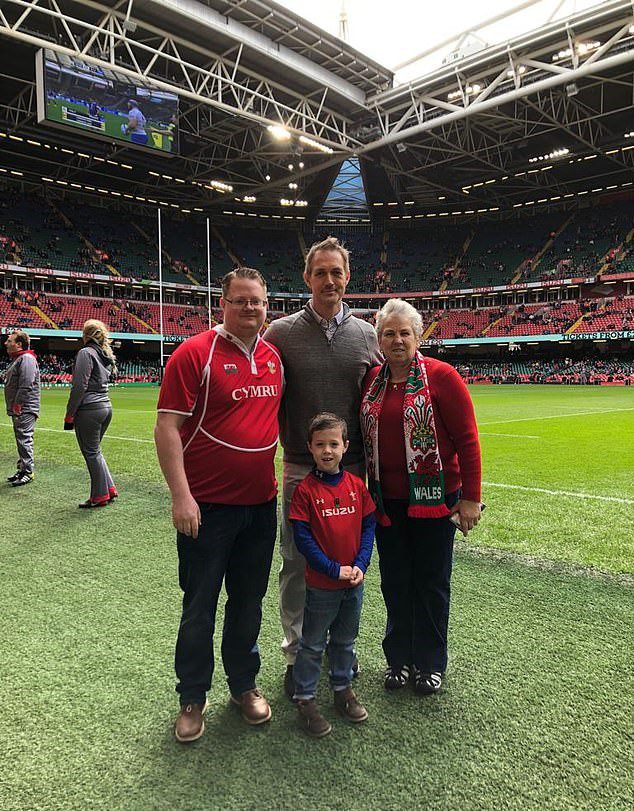
Leading charities and health organisations are urging defibrillator owners to register their devices on a new national database, called The Circuit – the National Defibrillator Network, which could help save thousands of lives from cardiac arrests in the coming years.
There are currently 5,712[1] public access defibrillators registered with the Welsh Ambulance Service. While the public seem more aware than ever of the potential for defibrillators to save lives when someone is having a cardiac arrest, the British Heart Foundation estimates there are thousands of defibrillators across Wales which the emergency services don’t know about – meaning they can’t be accessed in an emergency – and lives are being lost as a result.
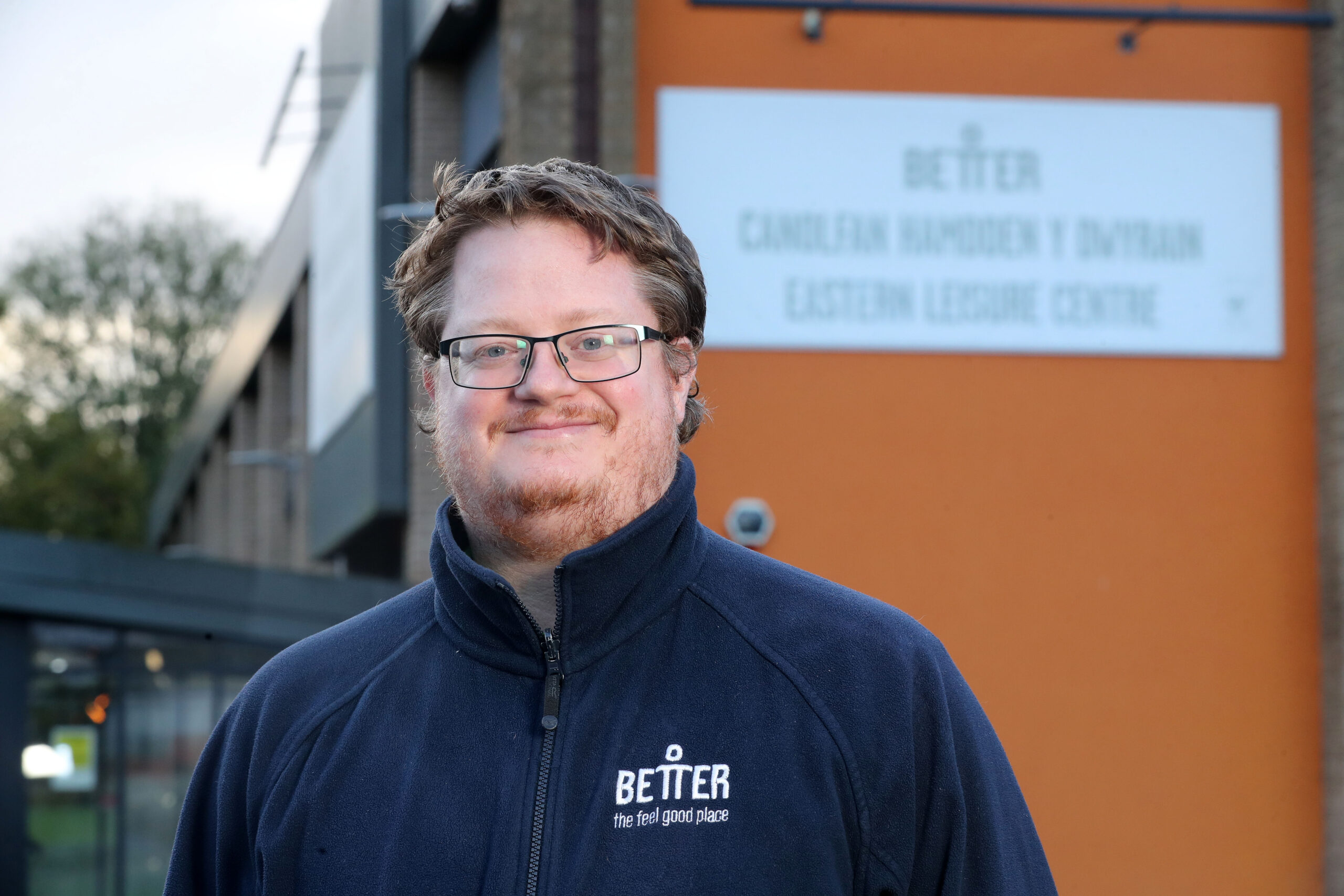
There are around 2,800 out-of-hospital cardiac arrests (OHCA) in Wales each year, but just 1 in 20 people survive.
Every minute without cardiopulmonary resuscitation (CPR) and defibrillation reduces the chance of survival by up to 10 per cent in some instances, but immediate CPR and defibrillation can more than double the chances of survival.
It’s estimated that public-access defibrillators (PADs) are used in less than 10 per cent of OHCAs across the UK.
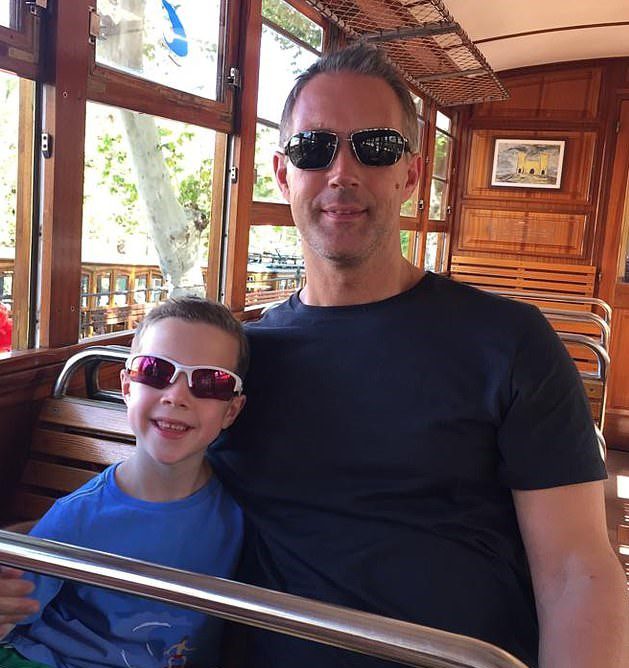
Andrew’s story
48-year-old Andrew Barnett describes the scene in December 2018 at Eastern Leisure Centre in Cardiff when his life was saved by strangers: “I’d taken my son to an adults–and–kids’ Christmas football match. I was running around as normal, kicking the ball. From what everyone tells me afterwards, I pretty much just fell straight on my face. It just happened instantly. I had a cardiac arrest.
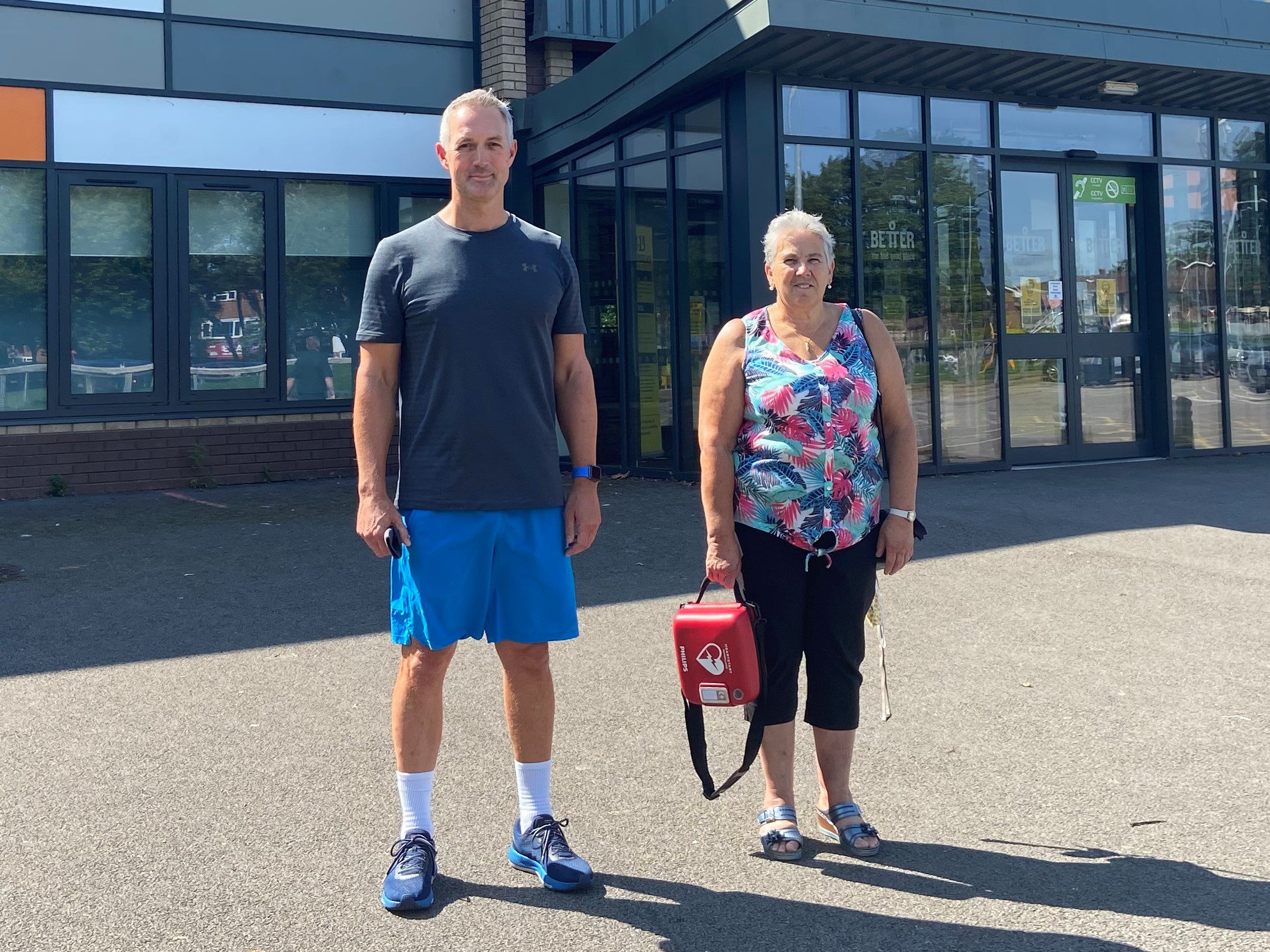
“Two of the leisure centre members ran out, and they also brought the defibrillator out as well, which was situated at the leisure centre. I think luck was a really big part of it, the location I was, that had trained staff, had the defibrillator available as well.”
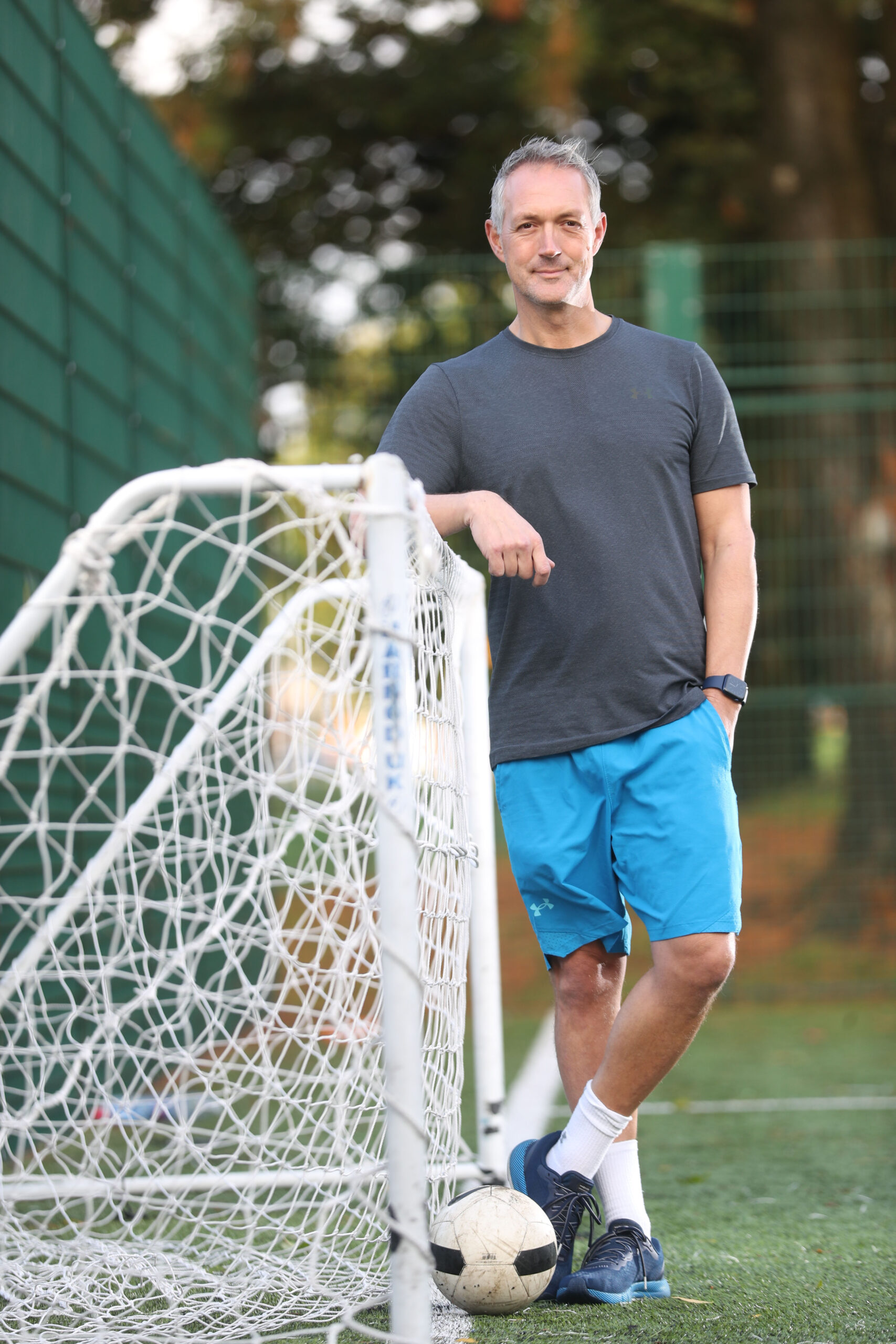
Leisure centre duty manager Ben Clarke was in the office when he was told about Andrew’s collapse. He says, “I grabbed the defibrillator from reception and ran out – as soon as I got there, I could see he was not in a good way, he was unconscious. I started CPR – a colleague started unpacking the defib. I continued CPR and the machine showed he needed a shock.”
Sheila Mott was a swimming instructor at the centre and used the defibrillator on Andrew. She followed the instructions given by the machine, which restarted Andrew’s heart. When the paramedics arrived, they did all their checks and took over before Andrew was taken to hospital by ambulance.
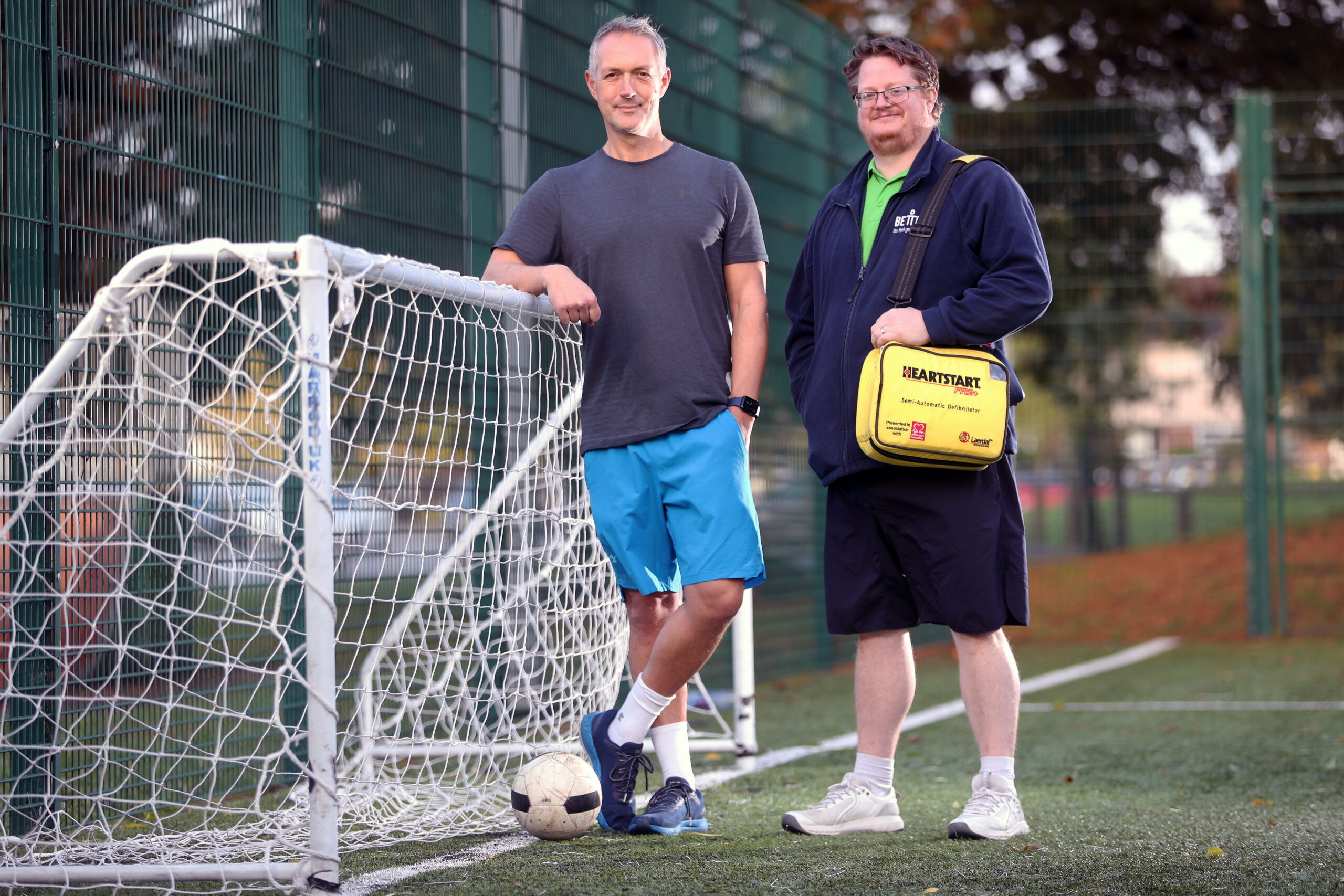
Andrew was treated for a blocked coronary artery with a stent and medication and has returned to an active life once more.
Andrew, Ben and Sheila are calling on anyone with access to a defibrillator to register as a defibrillator guardian on The Circuit, and Andrew’s story has been chosen as part of a national campaign from the British Heart Foundation to highlight the issue.
Andrew says, “I think The Circuit is another emergency service, if you like. It’s something that is going to be in our communities – town, cities and villages that will tell people exactly where they can get hold of a defibrillator. Having the network and knowledge of where they are for the ambulance service, I think it’s so important. I’d say to anyone who has a defibrillator in their club, community or workplace: Register your defibrillator to help save more lives.”
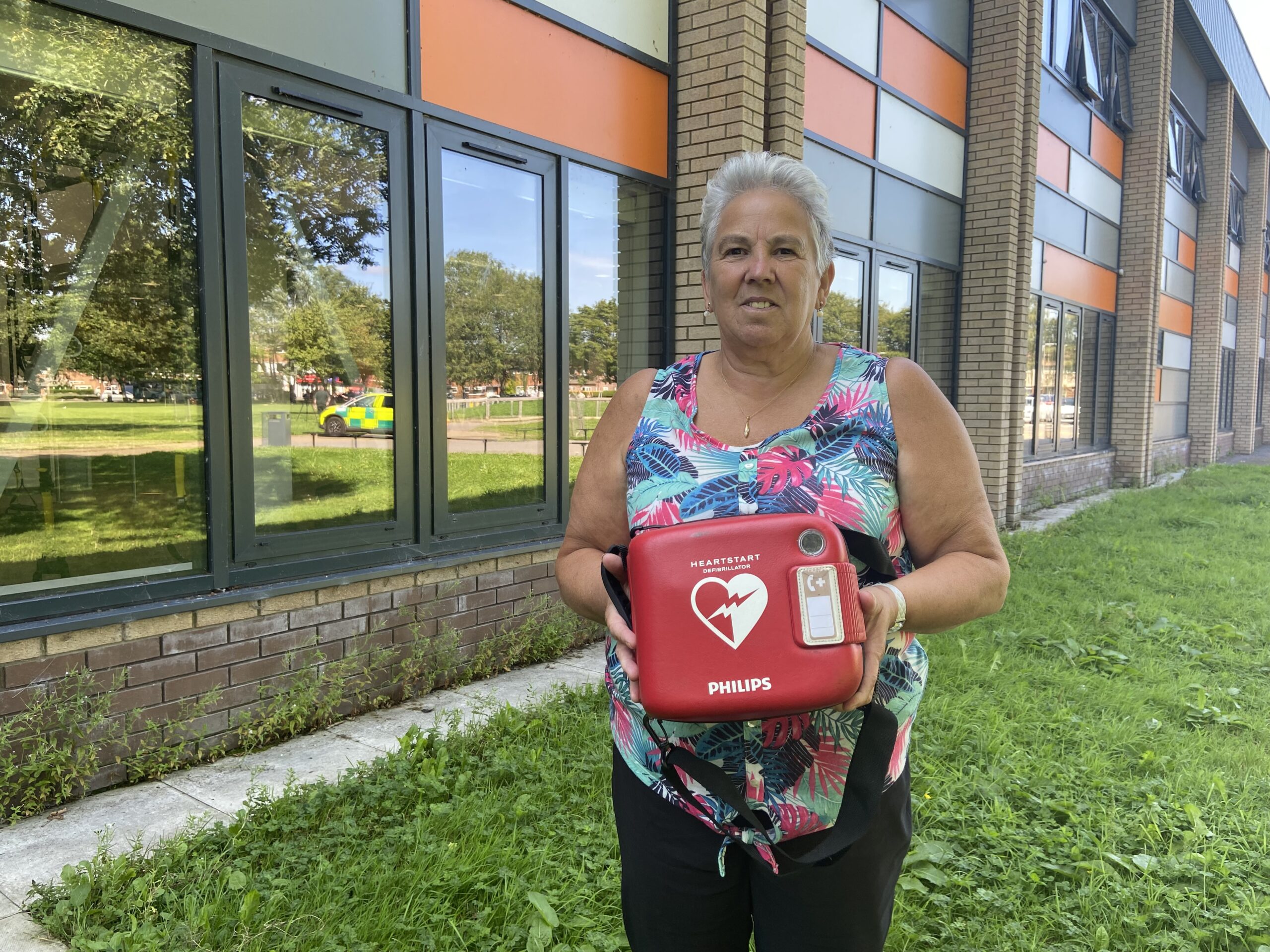
Sheila adds, “Everyone should learn CPR, and everyone who has access to a defibrillator should register it on The Circuit. Unless it’s registered, how will people know where it is if it’s needed?”
Adam Fletcher, Head of BHF Cymru says, “Every second counts when someone has a cardiac arrest and, alongside CPR, prompt use of a defibrillator is critical in giving them the best chance of survival. To put it simply – knowing where the nearest defibrillator is, could be the difference between life and death.
“The Circuit is pioneering technology which will help emergency services direct bystanders more quickly to a defibrillator when someone collapses with a cardiac arrest. But, for The Circuit to save lives, it is vital that the tens of thousands of unregistered defibrillators across the UK are put on the system.
“If you, or somebody you know is a defibrillator guardian, then we urge you to register your device on The Circuit. You could help save a life.”
Carl Powell is the Clinical Support Lead for Cardiac Care with the Welsh Ambulance Service.
He says, “A defibrillator is a medical device that’s used on patients who have suffered a cardiac arrest. Using a defibrillator is very, very safe. It will only deliver a shock to a patient if the patient requires the shock from the machine. The device will shock the patient to restart the heart into a normal rhythm. You can do no harm by using one.
“The Circuit is the system by which public access defibrillators are registered in the UK. It automatically informs ambulance services of public access defibrillators, their locations and their availability, and we can send a rescuer to collect the defibrillator so they can assist in the resuscitation of a patient.”
Following a number of high-profile cardiac arrests affecting members of the sporting community in Wales, Danish footballer Christian Eriksen’s cardiac arrest live on television during the 2020 UEFA European Football Championship in June, and the rapid use of CPR and a defibrillator following the collapse of a spectator at a Premier League match last weekend, there has been a surge in national awareness around defibrillators and CPR.
- On 15 th September Eluned Morgan MS, Minister for Health and Social Services announced £500,000 of funding to purchase almost 500 defibrillators for community groups and organisations across Wales. The money is conditional on applicants meeting several criteria, including registration on The Circuit – the National Defibrillator Network.
- BHF Cymru, Welsh Ambulance Service NHS Trust, St John Ambulance Cymru and Resuscitation Council UK (RCUK) warn that the UK’s low survival rate is likely to be in part because public access defibrillators are used in less than one in 10 out–of–hospital cardiac arrests. This is often because 999 call handlers aren’t always aware that a defibrillator is available nearby because the ambulance service hasn’t been told about it. If they don’t know it is there, they can’t direct someone at the scene to retrieve it while waiting for the ambulance to arrive.
- To help save more lives, BHF Cymru, WAS, St John Ambulance Cymru, RCUK, and Association of Ambulance Chief Executives (AACE) are urging people who look after defibrillators in places such as offices, communities, shopping centres and leisure centres, as well as in public places, to register them on a pioneering database called The Circuit – The National Defibrillator Network.
- While the 14 UK ambulance services have previously had their own regional databases, The Circuit – the National Defibrillator Network will eventually replace these with a new national database that lets the ambulance services see defibrillators right across the country. This will allow them to direct people to the nearest defibrillator when somebody is having a cardiac arrest, wherever they are, including across borders.
- The Circuit, which is already live in 12 of the 14 ambulance service regions across the UK[2] and will become nationwide soon, could help to save thousands of lives – but it is vital that as many defibrillators as possible are registered on the database for it to work effectively.
- Those who own and maintain defibrillators, also called defibrillator guardians, can still register their devices in areas that are not yet live on The Circuit, ready for when their ambulance services come online.
- It is estimated that there are tens of thousands of defibrillators which are still to be registered on the system. To make sure opportunities to save lives aren’t being missed, the organisations are aiming to see 70,000 additional defibrillators unknown to The Circuit registered across the UK by the end of 2021.
Helen Smith, Chief Executive Officer at St John Ambulance Cymru said, “Wales has some of the poorest survival rates in the UK for people experiencing an out-of-hospital cardiac arrest. Numerous studies show the positive effect CPR and early defibrillation can make to someone who needs it.
“We’ve been working alongside BHF Cymru and other organisations for several years educating the public about the impact defibrillators can and do make in an emergency, as well as training people in how to use them.
“Knowing where to find your nearest defibrillator in a life-threatening situation can quite literally mean the difference between a life lost and a life saved. Together with our partners, we’re urging everyone who owns or looks after one of these lifesaving devices to register them for free through The Circuit to help save more lives.”
Dr James Cant, Chief Executive Officer at Resuscitation Council UK, said: “A cardiac arrest can happen to anyone, anywhere, at any time. Not only is defibrillator use a crucial step in the Chain of Survival, the presence of defibrillators in public places can help raise awareness and stimulate people to think about what they would do in an emergency.
“Survival depends on all links in the Chain of Survival being carried out quickly. This means early recognition and calling for help, early CPR, early defibrillation and post resuscitation care – and The Circuit plays a vital role in giving people their best chance of surviving a sudden cardiac arrest.”
James Radford, Director of Strategy and Communications at St John Ambulance, added: “First aid, including CPR and early defibrillation, saves lives so we’re proud to be working with our partners to help ensure all defibrillator locations are known to the ambulance trusts and accessible when someone is in cardiac arrest.
“If you are the guardian of a defibrillator, please log its location on The Circuit – it’s quick and easy to do. We’d also like our existing customers and those who are buying a defibrillator from us for the first time to register this vital equipment on the database as soon as possible.”
It’s free to register your defibrillator onto The Circuit, and you only have to do it once. You can also register multiple defibrillators if you are the guardian to more than one. Visit TheCircuit.UK for more information or to register your defibrillator.
Help keep news FREE for our readers
Supporting your local community newspaper/online news outlet is crucial now more than ever. If you believe in independent journalism, then consider making a valuable contribution by making a one-time or monthly donation. We operate in rural areas where providing unbiased news can be challenging. Read More About Supporting The West Wales Chronicle



















